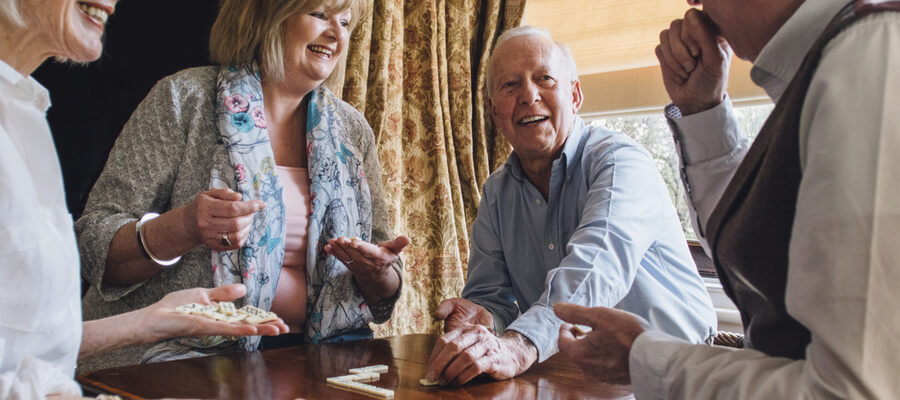The inexpensive way to brain health and heart health
Are you on the cusp of your golden years or well into your retirement? No matter how old you are, you are never too old to have fun. Although each of us may think of different things to do for fun, ultimately, it is about engaging in joyful pursuits, feeling alive, and staying engaged and connected. In fact, as you age, it becomes increasingly important to lighten your heart, and keep your mind sharp. And what better way to do that than to indulge in inexpensive, fun games that do not require much prep or space.
Play is important for all ages
Dr. Stuart Brown, the Director of National Institute for Play in California is renowned for his research on the importance of play. What constitutes play may differ for each individual. Whether it is playing board games, solving puzzles, reading, listening to music, or indulging in an art form, as long as it is pleasurable, you can reap several benefits:
- Neurological: From creativity and imagination, to critical thinking and problem solving, while playing, you are flexing your brain muscles. An active and engaged brain will help you develop and maintain your cognitive abilities, which in turn will help in reducing memory loss.
- Physiological: Playing or doing something you enjoy, translates into feeling excited and having fun. When you are feeling good, your body releases endorphins that make you happier, and temporarily lessen your aches and pains. Moreover, indulging in fun activities, such as word games, crossword puzzles, or brain games reduces the body’s production of stress hormones. It also releases muscle tension, lowers your blood pressure, boosts your immune system, and protects you against cardiovascular diseases.
- Psychological: Incorporating play into your schedule is all about giving yourself a happiness boost. Whether you compete with multiple players or challenge yourself, having fun and lightening up your mood helps combat the emotional or physical difficulties that come with aging. Fun and games can also help you make new friends and strengthen existing relationships.
As retirees or aging adults, do you worry that playing games seems juvenile? Many societies and cultures perceive playing as unproductive, or a guilty pleasure, especially after you reach adulthood. However, plenty of studies that reiterate the importance of fun, games and play for all ages have proven this notion to be wrong. As long as the play is accessible, sustainable, and aligned to your health and lifestyle, you will continue to enjoy and reap its many benefits.
Inspiring activities and games for Canadians
Looking for ways to prevent boredom, elevate your mood, forge new relationships, or give your mental health a boost? No matter what the end goal, there is no shortage of activities and games for you to choose from.
Depending on your fitness levels, preferences and objectives, here are some activities to consider:
- Spend time with family and friends: Compete with friends, family, or even grandchildren in a few rounds of mini golf, frisbee toss, ball toss, or traditional games, such as cards, puzzles and board games.
- Get active: Get mild exercise and improve your hand-eye coordination when you play games, such as badminton, bocce ball, tennis, or croquet. If you prefer less strenuous games, join clubs or leagues for pool, bowling, or chess.
- Live in the moment: Now is as good a time as any to reignite or pursue the passion or interests that you could not make time for during the hectic, working years. Sign up for lessons in music, art, dance, drama, or other activities that you have always wanted to explore.
- Socialize: Relive the old times, find engaging company, and make interesting conversation when you socialize. Participate in local club gatherings or community get-togethers for movie nights, karaoke nights, trivia nights, or other such events.
- Spend quality time with pets: Bring home a pet for mutually beneficial fun and companionship. Don’t wish to take on the responsibility of constantly looking after them? You could visit animal shelters that welcome people to spend quality play time with dogs, cats, and other friendly pets.
- Be close to nature: Make the most of the uplifting and healing powers of nature through activities, such as gardening, birdwatching, picnics, nature photography, hiking, or simply going on long walks outdoors.
- Indulge in arts, crafts and hobbies: Painting, pottery, papercraft, woodcraft, knitting, clay modeling, jewelry making; the possibilities of retirement hobbies you can pursue are endless. Not only can they be fun and therapeutic, but they also offer direct health benefits. For example, occupational therapists who work with you to reduce stress, anxiety and depression often recommend knitting as a means to calm your nerves and indulge in a purposeful activity.
- Active learning: You are never too old to learn something new. Build your skills, increase your knowledge, and get yourself trained in a new field of your liking. From writing code, and designing websites, to speaking a foreign language and cooking exotic meals, a growing number of older Canadians are challenging themselves in unexplored domains.
- Travel: Travel to new places to open up your mind to diverse cultures. Traveling can also help you meet new people and forge new friendships; a true blessing during the retirement years.
Popular indoor games: Make fun a top priority
In addition to outdoor games, hobbies and activities, there are many indoor games that can keep you busy, give you a sense of purpose and accomplishment, and make you genuinely happy.
Here are some fun games that you could take up during your retirement:
- Crossword puzzles: Solve the daily crossword puzzle in your newspaper or find books that feature hundreds of easy crossword puzzles or other types of word games. You can also look for free crossword puzzles online or download gaming apps for your digital devices. Challenge your vocabulary and complete the puzzles by yourself, or enjoy fun, social interactions when you solve them with help from your family members or friends.
- Brain games: There are many brain games that you can buy in stores:
- Jigsaw puzzles encourage your problem solving skills
- Memory games test and boost your ability to recollect
- Board games often compel you to employ your strategic skills
- Chess always works to keep your mind sharp
- Games like Sudoku challenge your numerical ability
- Self-created games: You can challenge your mind by inventing your own fun games. For example:
- Build a list of songs you want to listen to or movies you wish to watch and memorize it. After a few hours, try unaided recollection of all the names on your list.
- Use your non-dominant hand or leg for performing some of the daily chores. Not only will you be stimulating your brain cells, but making such play a daily habit could also strengthen your limbs and make you ambidextrous!
Puzzles and games for older adults with medical conditions
Whether you are in your golden years, or you are visiting a loved one, adding puzzles and games to your interactions could be more beneficial than you imagine. In addition to enhanced fun, choosing the right kind of games can deepen your social engagement and deliver direct health benefits. This is especially true for those suffering from psychological issues or those with limited mobility and other health issues:
- Stress, anxiety, boredom, or loneliness: Canadians who are lonely or depressed, long for the company of their friends and family. However, at times, such interactions may become burdensome or awkward. Take the pressure off forced conversations by including easy board games during these interactions. Some games loved by people of all ages include, Checkers, Bingo, Yahtzee, Connect Four, and all types of card games, such as Euchre, Go Fish, Crazy Eights and Rummy.
- Mild cognitive impairment: A tough jigsaw puzzle could contain as many as 5000+ pieces, whereas a simple one could be as little as 50 to 100 pieces. For those suffering from mild cognitive deficits, choosing an easy jigsaw puzzle gives them a sense of accomplishment and is pleasing to their eyes. Look for puzzles based on paintings by Van Gogh or Monet. Pictures of picturesque landscapes, beautiful gardens, adorable puppies or majestic horses could be a fun starting point.
- Alzheimer’s or dementia: Certain companies, such as Springbok make a special line of puzzles, specifically suited to individuals suffering from Alzheimer’s disease or dementia. These 36 to 100-piece puzzles contain large, easy-to-grip pieces that create stunning, vibrant pictures. Some of the popular pictures from their specialty line include:
- Morning Serenade: 36 pieces that create songbirds gathered on a fence
- Summer Creek: 36 pieces that form 5 magnificent horses crossing a river
- Take Flight: A 100-piece set that showcases colourful, hot-air balloons
- Declining vision or mobility: When the cognitive abilities are intact, but hand movements or eyesight is weak, look for puzzles with larger pieces. That way, checking or picking up the pieces becomes less of a challenge and completing the picture becomes the focus of the game. Some of the popular puzzles include:
- Country Meadow: A 300-piece jigsaw puzzle that features horses, birds and a farmhouse, along with a soothing meadow as the background
- Positano: A 500-piece jigsaw puzzle that contains a scenic Italian town overlooking the Mediterranean Sea
- Ravensburger Meet You at Jack’s: A 750-piece jigsaw puzzle featuring a charming, old-world diner scene
Another activity that most Canadians enjoy is decoding personalized photo puzzles. Select pictures of friends, family members, and favourite events or celebrations, and custom design your own photo puzzle. Walmart, Shutterfly or Portrait Puzzles offer such services, where you can upload photos to create your own puzzles.
Focus on fun activities during retirement with help from the CHIP Reverse Mortgage®
Indulging in fun activities during your retirement need not come with stress or worry about your personal or financial obligations. After all, playing games or solving puzzles are important aspects of remaining healthy and happy. The CHIP Reverse Mortgage can help take care of your retirement finances without putting a dent in your wallet. As a Canadian homeowner, you can get tax-free cash up to 55% of the value of your home, without the burden of any monthly mortgage payments. Not only do you get the additional spending power by cashing in on some of your home’s equity, but you also get to stay in the home you love.
Looking for more ways to spend your retirement?
- Retirement Activities, Hobbies and Interests
- How to Live Your Best Life: Travel Adventures in Retirement
- How Volunteering Can be a Good Opportunity for Retired Canadians
Want to make fun activities a priority in your golden years? Learn how the CHIP Reverse Mortgage can help you lead a fulfilling, worry-free retirement. To access the key to retirement happiness, call 1-866-522-2447 today.































